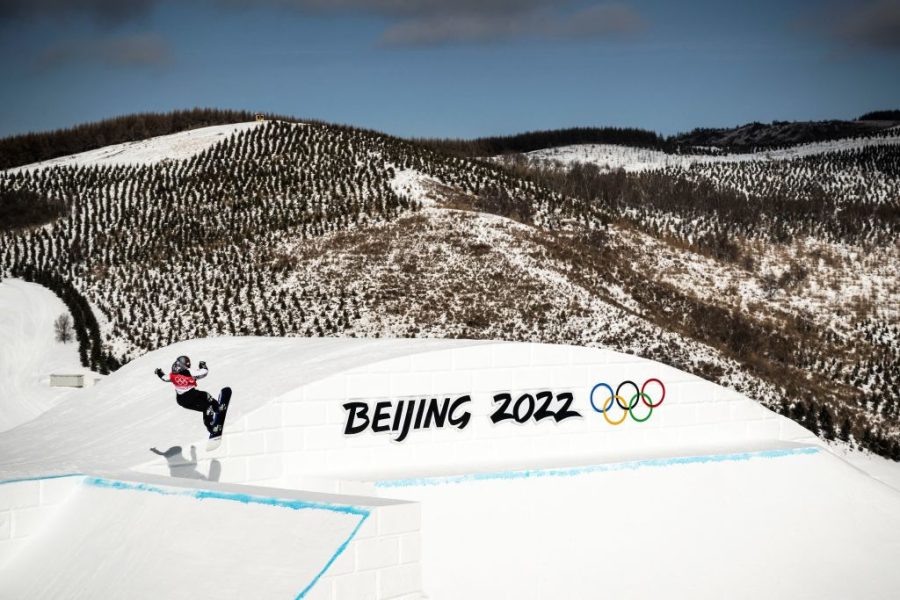Fake Snow In The Winter Olympics Is Harmful
An athlete takes part in a snowboard slopestyle practice session at Genting Snow Park in Zhangjiakou on February 3, 2022, ahead of the Beijing 2022 Winter Olympic Games. (Photo by Marco BERTORELLO / AFP) (Photo by MARCO BERTORELLO/AFP via Getty Images)
May 26, 2022
This year’s Winter Olympics was the first Olympics to have to fully rely on the production of artificial snow. China hosted the Winter Olympics twice, in 2008 and now in 2022, in the same city – Beijing. However, to host this year’s Olympics, China used about 2 million cubic meters of water – enough to fill 800 Olympic-sized swimming pools – to create enough fake snow for this year’s games according to Carmen Jong, a geographer at the University of Strasbourg, told the Smithsonian Magazine.
As someone who enjoys watching all types of outdoor sports, it is a shame to see how that “natural” feeling of sports was somewhat washed away in this year’s Olympics. Sports are meant to be watched and done in a natural, clean environment. Therefore, I highly dislike the idea of using fake snow for big events like the Olympics. When watching the Olympics, I remember seeing a huge contrast in the “snowy” area and the environment itself. I would see the rocky, muddy, brown, forest environment and the fake snow in one area and think that it looked so out of place. Personally, watching the Olympics was a little rough but the usage of fake snow is not going to stop at the Olympics.
Since Saudi Arabia does not have a Winter Olympics team (Saudi Arabia made their debut this year’s Olympics with only one skier), the Saudi Winter Sports Federation President Ahmed Shaher Al-Tabbaa says that they hope to find ski and snowboarding competitors to represent the country. To do this, Saudi Arabia is constructing an indoor ski resort that relies purely on fake snow. The ski resort contains a 40,000 square meter slope and the budget for the whole project is $27 billion. Considering the fact that Saudi Arabia is in the desert, the scorching hot temperatures cannot provide the country and the resort with snow. Thus, this whole resort will rely solely on fake snow and with such a massive scale, the amount of energy that is going to be needed to produce the fake snow will be enormous. Currently, the ski resort is still under construction and is planned to be opened to the public by early 2024.
A lot of controversies have sparked regarding whether fake snow should be used at all. Many environmentalists do not support the production of man-made snow because of the harm it creates if put in a natural environment. Fake snow is made out of polyacrylate polymer, a superabsorbent gel that can be shredded into thousands of resistant fragments to replicate snow. Since the “snow” is heavier and doesn’t melt due to chemicals, it seeps down into the ground and causes the vegetation below to perish because it blocks the absorption of nutrients. This can also affect animals that graze on the plants and vegetables that were covered by the “snow” causing a breakdown in the food chain.
Conversely, some athletes are on board with the fake snow while others are not. Matt Cox, an Australian snowboarder, says that the snow gives him a lot of grip which helps him slide easily in snowboarding competitions. On the other side, Johanna Taliharm, an Estonian biathlete, someone who does the biathlon – an event where cross-country skiing and rifle shooting are combined, says that the artificial snow is icier, thus she believes that it is more dangerous and faster which can cause many accidents without proper control.
Fake snow has become popular to use for big events like the Winter Olympics. However, the requirements and after-effects that fake snow has on the environment are far greater than its so-called “benefits” of it. Instead of hosting the Winter Olympics in a country where very little to no snow appears, it would be better to host the Olympics in a naturally snowy area. This will obviously prevent the usage of fake snow completely and will have a very beneficial effect on the environment. Furthermore, it will give winter sports that “natural” feeling once again and provide the Olympics with a nice background view whenever a shot is taken. In the near future, I hope to experience a natural, clean environment where the Winter Olympics reign the winter season.


